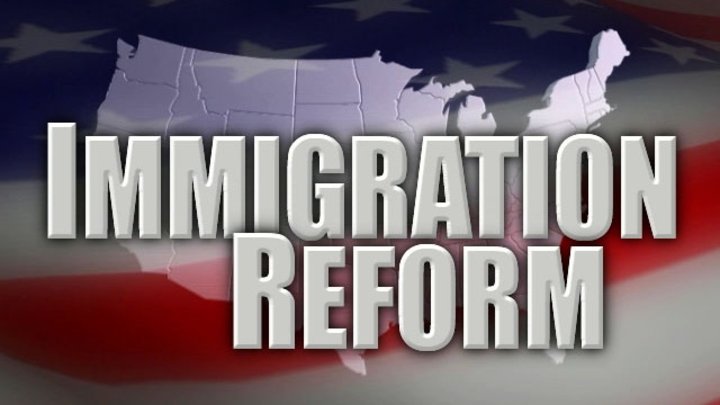8位议员将提出移民改革法案,以下是一些基本内容。
SOURCE: U.S. Senate staff and staff reports. GRAPHIC: The Washington Post. Published April 16, 2013.
Key provisions expected in immigration legislation proposal
Published: April 15, 2013
A bipartisan group of eight Senators is expected to unveil legislation that would represent the most sweeping overhaul the nation’s immigration laws in nearly three decades. Here is a look at the key provisions likely to be included in the bill. Read related article.
Path to Citizenship
|
Most of the 11 million people who are in the country illegally could apply for a green card after 10 years and citizenship three years after that. |
|
Applicants must pay a $1,000 fine, pay back taxes, learn English, remain employed and pass a criminal background check. |
|
Immigrants must have arrived in the United States before Jan. 1, 2012, to be eligible. |
|
Dream Act youth can obtain green cards in five years and citizenship immediately thereafter. |
Border Control
|
The Department of Homeland Security will receive $3 billion to improve border security through surveillance drones and 3,500 additional customs agents; $1.5 billion for fencing. |
|
Within five years, DHS must achieve 100 percent surveillance of the southwest border with Mexico and apprehend 90 percent of people trying to cross illegally in high-risk sectors (areas where more than 30,000 people are apprehended annually). |
|
If DHS does not meet the metrics, a border commission composed of governors and attorneys general from border states would be given five more years and additional funding to implement more stringent measures. |
|
U.S. companies must implement the “E-verify” computer tracking system that aims to ensure that workers are legal residents within five years. All non-citizens will be required to show “biometric work authorization card” or “biometric green card.” |
|
The government must implement an exit/entry tracking system at ports of entry to determine whether foreign visitors or workers overstay their visas. |
H-1B high-skilled visas
|
Visas for highly skilled engineers and computer programs would double from 65,000 to 110,000. In future years, the cap could rise to as much as 180,000. |
|
Require employers with large numbers of H-1B visas to pay higher salaries and fees. |
Guest worker “W-visa” program
|
New visa program for 20,000 foreigners in low-skilled jobs starting in 2015. Number of visas increases to 75,000 in 2019. |
|
New federal bureau to analyze employment data to make recommendations for annual guest-worker visas caps beginning in 2020, to exceed no more than 200,000 annually. |
|
Construction companies limited to no more than 15,000 visas per year. |
|
“Safety-valve” to allow additional visas over the annual cap provided employers pay workers higher wages. |
Farm worker H-2A program
|
Visas for agriculture workers limited to 337,000 over three years |
|
Wages based on survey of labor-market data for various farming jobs. |
Changes to family visa program
|
Allows unlimited number of visas per year for foreign spouses, children and parents of U.S. citizens and permanent legal residents. |
|
Eighteen months after the law takes effect, eliminates visas reserved for foreign brothers and sisters of U.S. citizens, and married children over 30 years of age. |
|
Eliminates diversity visa program starting in 2015. Creates new merit-based visa category using point system based on family ties and work skills. |





